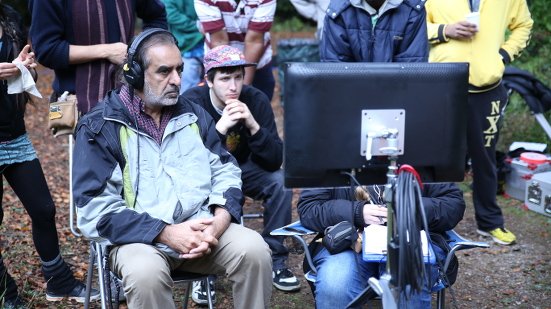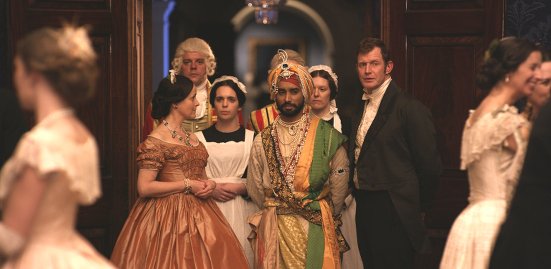
The film The Black Prince has been winning awards at various festivals in the West. It was also featured in Hollywood star Geena Davis’s film festival: The Bentonville Film Festival. The Black Prince is based on the life of the last Sikh kingdom heir Duleep Singh who was the son of the lion king of Punjab, Maharaja Ranjit Singh. After promoting the film at a sold out screening in Brampton, Canada, director Kavi Raz shared his insights with Minority-Review’s Swati Sharan about bringing this period epic to life.
1. Given Maharaja Ranjit Singh’s persona, how come we haven’t seen very much of Duleep Singh in popular cinema or TV considering he was the last heir in this Sikh dynasty?
That’s a really interesting question. Had Maharaja Duleep Singh (played by Satinder Sartaaj, read his interview here) got into a battle and lost or won it or lost his life, he would have been more of a heroic figure for Sikh history. That didn’t happen. So it comes out for TV as a quiet story. You need a key hero who goes out and lays out his life for a cause. He died by himself in a Paris hotel. His heroism was in the attempt that he made all by himself. He gave up everything in his life. He gave up his family and his comfortable life in England for a good cause. And he failed in his attempt.
He didn’t get the opportunity to go into the battlefield. So you don’t see him in terms of a great heroic figure. It’s difficult to tell a story about a character like that. That’s part of the reason I hope that we have succeeded in that. You can see the heroism in the character. He was a man who had everything one could hope for except a kingdom. But he lived a very comfortable life and he gave up all of that. He finally realised who he was and where he came from and what he had and the cause he had to fight for.

A scene from The Black Prince
2. What drew you to this film?
I was actually brought into the process a little bit later. Jasjeet Singh was our main producer and this was a subject that was very dear to him. He worked on the story himself and he formed an emotional connection to Duleep Singh’s life and wanted to make this film. When I was brought in to write it, I knew a little bit about the history of this. I am Sikh myself. But I didn’t know too much. Like most people, I had an inkling of it.
Jasjeet Singh had already done a lot of research. He gave me all the books and then I read them. I was just fascinated by his knowledge of Duleep Singh’s life. I approached it more from an emotional sort of an angle. He’s a kid who at the age of five was the king of perhaps one of the most powerful kingdoms of that time. He was in control of immense personal wealth including the kohinoor diamond. And then he was separated from his mother at the age of seven. Then he’s taken out of his kingdom and in fact, the sub-continent of India and his culture. What must he have gone through? So what really attracted me to this was the emotional angle of his life. He’s a child torn from his mother and then only sees her after 14-15 years. To me, that formed the heart and soul of the character and the story.
3. Interestingly, Anita Anand’s book on Sophia Duleep Singh (Sophia: Suffragette Princess) has been a great revival with its unearthing of Ranjit Singh’s family history in England. But of course, the book is from the perspective of Sophia and her siblings. So that perhaps makes Duleep Singh look uncomplimentary because of his personal issues. Do you feel compassion towards him because of how circumstances shaped up for him or are you neutral as a filmmaker?
I do feel a great deal of compassion for him. Like I said earlier, if you look at it from the emotional angle and what he must have gone through, you can see it this way. But ya, if you look at it from his family’s perspective, he forsaked them. He walked away from them. But then when you see where he came from, he had no family connection. He didn’t have any family life from which to draw upon. He was torn all his life. And then he was forced to live a life that wasn’t his life. The British thrust this new life upon him including women being forced upon him. In a modern context, you would say that he was really messed up and needed to see a psychologist or psychiatrist. But at that time, he was dealing with all of that all on his own. And he’s torn between it all.The mother is telling him one thing and the British are telling him something else. He’s really torn.
And of course, looking at it from the daughter’s or family’s perspective, he walked away from them. I don’t know if you got a chance to see the film last night but his wife kind of realises that he’s onto a bigger cause than her and their children. There’s nothing that’s going to stop him. And that’s the last time he sees her. So yes, from that point of view, he was not seen in a good light. But if you see it from a bigger perspective, he gave up all that for a much bigger cause or what he truly felt was the right cause.
4. Can we in Canada draw from the examples of how colonisers tried to make Aboriginal kids dysfunctional on purpose by trying to snatch them away from their parents or put them into residential schools? They lose their way of life and help colonisers gain power…
Absolutely. That’s a wonderful parallel. And that was the practice that the British Empire followed throughout the world. In this case, in principle, the British were very careful about how they manouvered his life. There’s a scene in the film as well where he questions, “Why didn’t you kill me when I was a kid?”
And the reason for that was as I theorise (and not just limited to the film) is there would have been a rebellion back home among the Sikh soldiers and the British army. So they kept him alive. They painted a picture that he is the one doing everything. He is the one forsaking his Sikh faith. He is the one embracing Christianity and they have nothing to do with it. He is the one embracing western ideology, leading this amazing life with the women around him, drinking and all that kind of stuff. They painted a very bad picture of him. That’s a great misconception about his life as well that he didn’t care about being king and that he gave up his kingdom and was very comfortable with his new life in England.
5. I heard somewhere that Duleep Singh was the first officially recorded Sikh to have settled in England. But would he be considered the first recorded Indian given that there was a history of Lascars (sailors largely of Indian, Chinese or Arab origin) who were known to reside in England earlier on in the 18th century? (Note: They were living in temporary homes)
From what I read, he is actually listed as the first Indian to settle in England. The sailors weren’t considered residents (on paper). So he became the first resident Indian.
One interesting thing about Duleep Singh, which really fascinated me was how so little was considered and so little quoted. When he first goes there, he raises the voice for the Sikh kingdom. He wanted his kingdom back. Further still, he was one of the first to actually raise the voice for India’s independence and not just for his kingdom. He rallied and lobbied all of the kings. His last effort was when he made his trip to Russia to ally with the Russian army and invade India through Afghanistan and all the kings and kingdoms of India would join hands with him. He reached out to all of them. They all responded with a resounding “Yes. Together we’ll fight the British and throw them out of India.” So the idea was that the British would be thrown out of India and not just his kingdom. So his concern was much bigger than a personal agenda.
But ya, there’s very little recorded here. We found this through our research, but no one gives him the credit because hardly anyone knew about it all.
6. That’s the unfortunate part of their family history…
Ya, there are no heirs. His children didn’t bear any kids. So there’s no living heir left of the great lion of Punjab, Maharaja Ranjit Singh.
7. When will you come back to Canada next?
I think we’ll come back in July to promote this film.
Watch the trailer here:



0
comments